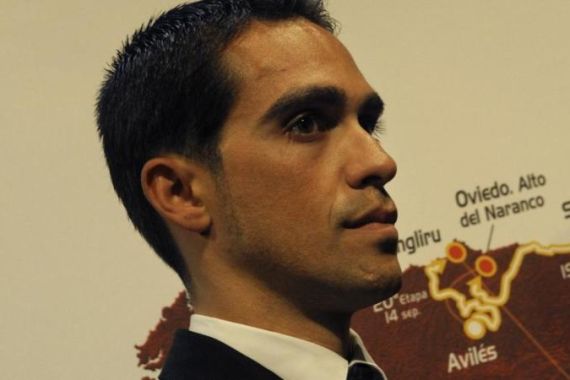Alberto Contador: ‘It will be war’
Spanish rider Alberto Contador has come out fighting after organisers reveal ‘a very, very hard’ Vuelta a Espana route.

Alberto Contador declared “it will be war” after he studied the route for this year’s Vuelta a Espana race which will feature a record 11 summit finishes for a Grand Tour.
Organisers unveiled the route on Saturday which will begin on August 24 in Galicia’s rugged Rias Baixas regions. Riders will have to tackle a first category mountain-top finish as soon as stage two.
Keep reading
list of 4 itemsSwiss cyclist dies after fall into ravine during Tour de Suisse
Cycling Under Siege in Gaza
Pushing for women’s race, group tackles Tour de France
They then face three summit finishes in Andalusia, three in the Pyrenees before culminating in the 13 km Angliru, reputedly Spain’s most difficult climb.
“It will be war right from the second stage and it’s going to be very, very hard,” last year’s winner Alberto Contador told reporters.
“It’s true that many of the stages are short but they’ve put the toughest climbs in the last 40 or 50 kilometres and that’s when the overall contenders are fighting the hardest.
“We saw last year that race-winning attacks can happen on all kinds of stages, but we will have to be in good shape right from the start of the race. There are no quiet moments.”
Fellow Spaniard, Joaquim Rodriguez, the world’s top ranked rider, added: “It’ll be survival of the fittest.”
‘A bit risky’
This year’s race will enter unexplored territory when the opening 27 km team time trial starts on a giant raft, used usually for seafood farming in one of Galicia’s many fjords.
“Starting on one of these rafts is a great recognition of our seafaring tradition,” said regional president Alberto Feijoo at the presentation in a theatre in central Vigo, which concluded with live music by dozens of Galician bagpipers, drummers and local flautist Carlos Nunez.
Running anti-clockwise along Spain’s edges, riders will have to conquer a 16 km final ascent at Estepona’s coastal resort on stage eight before turning north for the individual time trial at Tarazona and three brutally difficult days in the Pyrenees.
The final showdown will come 24 hours before the finish in Madrid on September 15, with the ascent of the infamous Angliru in western Asturias, the climb which decided the race both in 2008 and 2011.
“It’s not one for time triallists like me, it’s going to be for born climbers,” five-times Tour de France winner Miguel Indurain said.
“Even the time trial is hilly.
“Of course it’s a bit risky (having so many mountains) but it’s what the organisers have been doing in the last few years and for the moment it’s worked out well.”